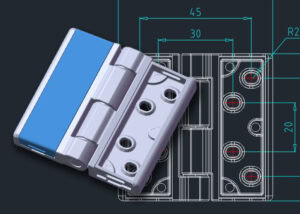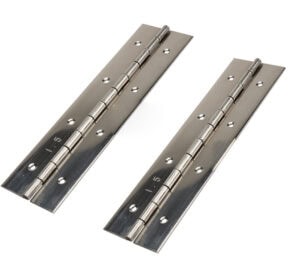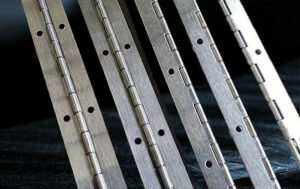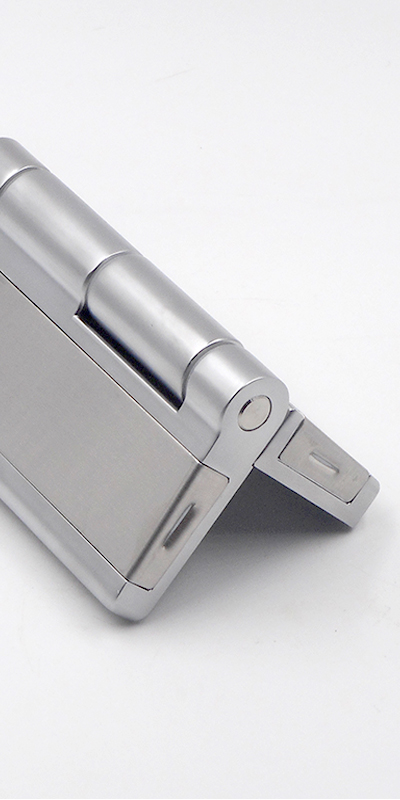Squeaky door hinges can be annoying, leading to frustration and potentially damaging your door or butt hinges. Ignoring this problem can cause wear over time. The solution lies in choosing the right lubricant to reduce friction and prevent future squeaks.
The best lubricants for door hinges are silicone-based sprays, white lithium grease, or graphite powders. These lubricants reduce friction, prevent rust, and ensure smooth door movement without attracting dirt or dust, which oil-based lubricants might do.
Finding the right lubricant is crucial for preventing squeaks and ensuring the longevity of your door hinges.
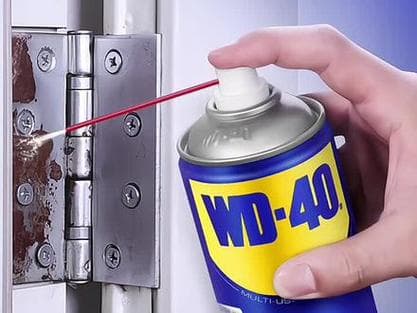
Types of Lubricants for Door Hinges
There are various types of lubricants suitable for door hinges, each with its pros and cons. Choosing the right one depends on the hinge type, location, and material.
Silicone-Based Sprays
Silicone sprays are among the best options for lubricating door hinges. They reduce friction effectively and prevent future squeaks. Silicone is ideal for both indoor and outdoor use, as it doesn’t attract dust and resists moisture, making it great for high-humidity environments. Additionally, silicone sprays provide long-lasting lubrication while leaving minimal residue, making them ideal for those who prefer a cleaner application process.
White Lithium Grease
White lithium grease is a heavy-duty option, perfect for long-term lubrication. It’s especially effective for exterior doors or heavy doors that endure frequent usage. The thick consistency of lithium grease ensures long-lasting lubrication but can be messier to apply than silicone sprays. However, its resilience in adverse weather conditions makes it a top choice for outdoor applications, ensuring smooth hinge movement even in high-traffic or moisture-prone areas.
Household Oils as Lubricants
Many homeowners may consider using household oils to lubricate door hinges. However, these alternatives come with limitations.
Vegetable and Olive Oil
Though vegetable and olive oil may temporarily stop squeaks, they are not recommended for long-term use. These oils attract dust and can become sticky over time, causing more friction and possibly damaging the hinge. The sticky residue left behind by these oils can also make cleaning the hinges difficult, leading to dirt buildup and increased wear on the hinges over time.
Baby Oil and Vaseline
Baby oil can be used as a temporary solution, but like vegetable oil, it tends to attract dust. Vaseline, on the other hand, works well for short-term fixes, but it is not a long-term solution since it lacks the endurance of silicone or lithium grease. Vaseline’s thicker consistency makes it a slightly better option for short-term fixes, but it can harden or dry out, reducing its effectiveness over time.
Powdered Lubricants for Door Hinges
Dry lubricants such as graphite powder are another effective solution, particularly for interior doors.
Graphite Powder
Graphite powder is a popular dry lubricant for door hinges. It’s ideal for areas where you want to avoid mess, as it doesn’t attract dust or dirt. It’s particularly useful for interior doors and provides long-lasting lubrication with minimal cleanup required. This makes it a preferred choice for homeowners looking for a low-maintenance solution that doesn’t compromise on performance.
Avoiding Common Mistakes When Lubricating Hinges
Applying the wrong type of lubricant or using an improper application technique can lead to issues.
Avoid Using WD-40 as a Long-Term Solution
WD-40 is often mistakenly used to lubricate door hinges. While it may offer a short-term fix for squeaky hinges, it’s primarily a degreaser and solvent. Over time, WD-40 can dry out the hinge and exacerbate squeaking issues. This makes it a poor choice for long-term lubrication, as it doesn’t provide the necessary protection to maintain smooth door operation.
Clean Hinges Before Lubricating
It’s important to clean the hinges before applying any lubricant. Dust, dirt, or old lubricant residue can impede the effectiveness of new lubricant applications, so wiping down hinges first is key to optimal performance. A clean hinge ensures that the lubricant adheres properly, allowing for smooth and efficient door movement.
How to Properly Lubricate a Door Hinge
Following the correct process ensures effective lubrication and long-lasting results.
Step-by-Step Lubrication Process
Begin by removing the hinge pin and wiping it clean. Apply a small amount of your chosen lubricant directly to the hinge pin and inside the hinge. Reinsert the pin and move the door back and forth to distribute the lubricant evenly. This step ensures that the lubricant penetrates all parts of the hinge, reducing friction and preventing future squeaks.
Reapply Lubricant as Needed
Depending on the type of lubricant and the door’s frequency of use, you may need to reapply the lubricant every few months for optimal performance. Regular maintenance helps keep the hinges in top condition, extending their lifespan and ensuring quiet, smooth operation.
Choosing the Right Lubricant for Different Environments
The location and usage of the door determine the best lubricant for the hinge.
Interior vs. Exterior Hinges
For interior doors, silicone spray or graphite powder is usually sufficient. However, exterior doors, which are exposed to moisture and varying weather conditions, benefit from the thicker consistency and water resistance of white lithium grease. Exterior doors are more prone to wear from environmental factors, so using a more durable lubricant can prevent rust and deterioration.
High-Traffic Areas
Hinges in high-traffic areas, such as entry doors or office doors, require more frequent lubrication. White lithium grease or silicone spray can withstand constant use and prevent squeaks for longer periods. Regularly lubricating hinges in these areas helps prevent premature wear and tear, ensuring the door remains functional and quiet.
Benefits of Regular Hinge Lubrication
Maintaining a regular lubrication routine helps prevent squeaks and damage to your hinges over time.
Reduced Wear and Tear
Lubricating your door hinges regularly prevents friction, which can wear down the metal over time. This extends the lifespan of both the hinge and the door. Regular lubrication also helps prevent rust and corrosion, which can weaken the hinge and cause structural issues with the door.
Quiet and Smooth Operation
Lubricating hinges ensures your doors operate smoothly without the irritation of squeaks. It also helps in minimizing rust and corrosion, especially for exterior doors exposed to the elements. This leads to quieter, more efficient doors that require less maintenance over time.
Conclusion
The best lubricant for your door hinges depends on the door type and environment. Silicone-based sprays and white lithium grease are excellent choices for long-term lubrication and protection.

